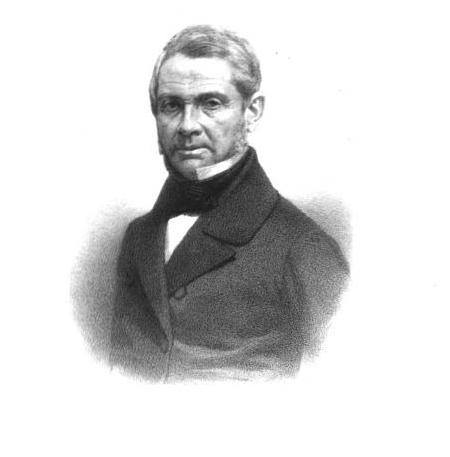
José Antonio Saco y López Cisneros, was born in the city of Bayamo on May 7, 1797 into a prominent family of Bayamo´s society. As a teenager, at the age of 14, he was orphaned by both parents. He carried out his first studies in his native land, and later entered in 1814 at the Colegio Seminario San Basilio in Santiago de Cuba, where he studied Philosophy and Law.
Years later he moved to the capital, where he began studies in Philosophy at the San Carlos Seminary in Havana with Father Félix Varela, which he concluded in 1819 with a Bachelor's degree in Civil Law. That same year he enrolled at the Royal and Pontifical University of San Geronimo in Havana, where he obtained a Bachelor's degree in Philosophy, in 1822.
José Antonio Saco was one of the founders of the Cuban Academy of Literature, for whose defense he was deported under the orders of Captain General Miguel Tacón in 1834, moving initially to Great Britain, later to France, and finally to Spain.
Between 1837 and 1845, he lived in Germany, Italy, Austria and France, time when he devoted special attention to the ethnic problem in Cuba, especially with regard to the slave trade. Similarly, the years from 1848 to 1854 would be characterized in Saco's work by the increase in his determined incursion into the campaign against the ideas and conspiracies aimed at annexing Cuba to the United States, which motivated the restart of his work in favor of liberal reformism, as evidenced in his works titled: The political situation in Cuba and its remedy and Question of Cuba.
He then traveled to Cuba towards the end of 1860, under the unconditional amnesty granted by the Metropolis government six years earlier, but his stay lasted only several months, after which he returned to Paris in July, 1861, where he resided for five years.
Commissioned by Santiago de Cuba to attend the Information Board, a body that had to propose the bases on which the laws to be presented in the Spanish Courts for their subsequent application on the Island would be based, he traveled to Madrid in 1866, but nevertheless and despite his outstanding work in the sessions of the aforementioned Board, the results of that meeting were destined for the most resounding failure.
Much of his intellectual work was aimed at solving Cuban problems based on his extensive knowledge, trying to insert the most modern and advanced thought and science in the Cuban reality, in order to produce an indigenous development, in accordance to your needs and characteristics.
Around 1820, he published his first political article in the Diario del Gobierno Constitucional de La Habana, and then studied in the United States between 1824 and 1826.
His work Memory on roads of the island of Cuba, was awarded by the Economic Society of Friends of the Country in 1829. In the aforementioned Memory, Saco mentioned the situation of abandonment that characterized the roads of the Island, where only the execution of roads, while addressing the experiences of England and the tropical characteristics of the nature of Cuba. The Memory had a great repercussion at the time, and contributed decisively to the preparation of the first road works program, which was available in Cuba.
From 1877 Saco lived in Barcelona, where he died and was buried on September 26, 1879, but fulfilling a testamentary will, his mortal remains were sent to Cuba, receiving them in Havana on August 17, 1880, where they were exposed in the Royal Academy of Medical, Physical and Natural Sciences of Havana.
Three days later, the burial took place in the Colón Cemetery, under severe repression that prevented any type of public demonstration, in the farewell of the person who had requested that the following epitaph appear on his tomb: “Here lies José Antonio Saco, who was not an annexationist, because he was more Cuban than all the annexationists.”


